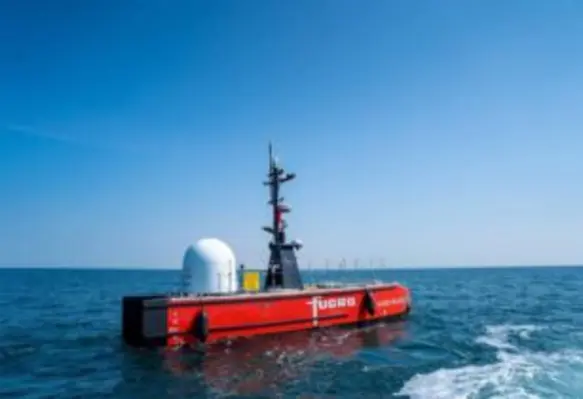Geo-data specialist Fugro has completed the Middle East’s first remotely operated subsea inspection using a low-carbon emission uncrewed surface vessel (USV)
Without deploying employees offshore, the site survey and inspection of an offshore gas platform in UAE seas were carried out fully from an onshore remote operations centre (ROC) utilising Fugro's Blue Essence technology.
Fugro successfully finished its first USV operation for a customer in the Middle East in early 2023 after commissioning the region's first ever government-licensed USV. Early in June, Chinese operator Atlantis mobilised the Fugro Pegasus USV (a member of the Blue Essence fleet) to conduct a subsea survey and inspection of the UAQ3 platform within the Umm Al Quwain gas field.
An expert crew of seafarers and surveyors carried out this ground-breaking operation from Fugro's onshore remote operations centre (ROC) in Dubai. A Blue Volta electric remotely operated vehicle (eROV) was installed on the Fugro Pegasus USV to evaluate the platform's structural integrity and provide a thorough map of the surrounding seabed. Atlantis was able to monitor the data in real time during the process since the data was broadcast to the ROC. This allowed the team to build a thorough risk assessment for the client's forthcoming decommissioning programme by swiftly identifying and looking into areas of greater interest.
The Blue Essence USV fleet is a component of Fugro's remote & autonomous operations initiative, which enables the company to provide its clients with market-leading geospatial insights with increased effectiveness, safety, and sustainability. The USVs can go up to two weeks at sea without fueling because to their efficient design and enhanced fuel system, which reduces carbon emissions by 95% compared to traditional boats. A more localised and diverse workforce can be built onshore thanks to the capacity to remove employees from the offshore environment, which also greatly lowers health and safety hazards.
Patrick Boyce, drilling manager at Atlantis (UAQ) ltd, said, “Fugro’s remote survey technology aligned seamlessly with our projects HSEQ, technical goals and was the most attractive commercial choice. The Fugro Pegasus was able to mobilise on time and despite difficult sea conditions, it completed the full scope of work in 40% of the allotted time frame. The USV operation was managed by the technical team at the very impressive Fugro ROC. Communications with the USV were strong throughout and provided excellent imaging results. Of particular note was the evident expertise and professionalism of the Fugro team, who have obviously dedicated many months to honing their execution procedures.”
Hannes Swiegers, Fugro’s director of IRM Services & Remote Operations for the Middle East and India, said, “This is a significant milestone for our Middle East business and demonstrates how novel technologies can play a key part in delivering our clients’ long-term safety, sustainability and in-country value (ICV) ambitions. Together with our clients, we are setting a new standard in Geo-data acquisition and analysis through continuous innovation, reducing unnecessary time, risk and carbon emissions. This new era of remote and autonomous technology will define the future of offshore operations in the energy sector and contribute towards a safer and more sustainable world.”







